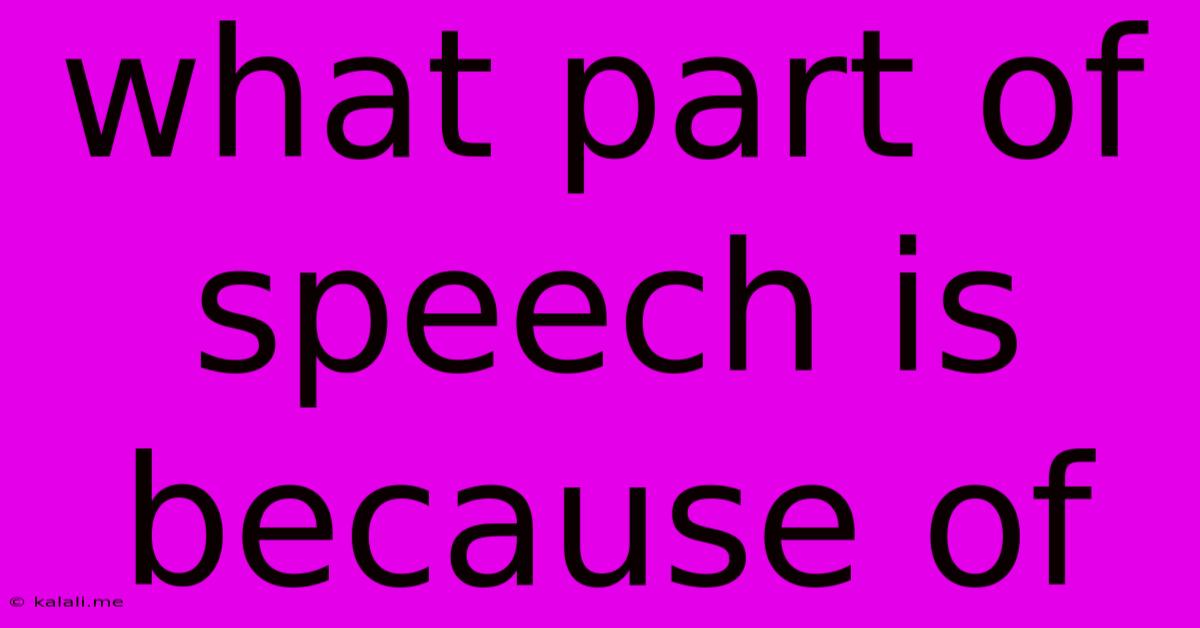What Part Of Speech Is Because Of
Kalali
Jun 05, 2025 · 2 min read

Table of Contents
What Part of Speech Is "Because Of"?
Understanding the grammatical function of phrases like "because of" is crucial for writing clear and concise sentences. This article will delve into the part of speech of "because of," exploring its usage and providing examples to solidify your understanding. This seemingly simple phrase adds depth and complexity to sentence structure, so let's unpack it.
"Because of" functions as a prepositional phrase. It's not a single part of speech like a noun or verb, but rather a group of words working together to act as a preposition. The preposition "because" introduces a reason or cause, while "of" introduces the object of that reason. Together, they express causality.
Understanding Prepositional Phrases
Before we dive deeper into "because of," let's quickly review prepositional phrases. A prepositional phrase consists of a preposition (like "because of," "in," "on," "with," "during," etc.) followed by its object, which can be a noun, pronoun, or gerund. This phrase acts as a single unit, modifying another word in the sentence. It usually answers questions like "where," "when," "how," or "why."
"Because Of" as a Prepositional Phrase: Examples
Let's examine how "because of" functions in sentences:
-
The game was cancelled because of the rain. Here, "because of the rain" modifies "cancelled," explaining the reason for the cancellation. "Rain" is the object of the prepositional phrase "because of."
-
She succeeded because of her hard work and dedication. "Because of her hard work and dedication" explains the reason for her success. The phrase acts as an adverbial phrase, modifying the verb "succeeded."
-
Because of the unexpected traffic, he was late for the meeting. "Because of the unexpected traffic" explains the reason for his lateness. "Traffic" is the object of the prepositional phrase.
Distinguishing "Because Of" from "Because"
It's important to differentiate "because of" from "because." "Because" is a subordinating conjunction, introducing a dependent clause. This means it joins a dependent clause (a clause that cannot stand alone as a complete sentence) to an independent clause.
Compare:
-
Because of the storm, the flight was delayed. ("Because of" is a prepositional phrase)
-
The flight was delayed because the storm caused severe turbulence. ("Because" introduces a dependent clause)
Notice how "because" requires a complete clause following it, while "because of" directly introduces the reason.
Using "Because Of" Effectively
When writing, choose the phrase that best suits your sentence structure and desired level of formality. "Because of" often offers a more concise way to express causality, particularly in shorter sentences, while "because" allows for more complex explanations and elaboration.
In conclusion, "because of" is a prepositional phrase that expresses a reason or cause. Understanding its function is key to constructing clear, grammatically correct, and effective sentences. Remember to choose the most appropriate phrase – "because of" or "because" – to convey your intended meaning concisely and accurately.
Latest Posts
Latest Posts
-
What Are Characters Called In A Play
Jun 06, 2025
-
When To Use Average Vs Median
Jun 06, 2025
-
How To Remove Bolts That Are Stripped
Jun 06, 2025
-
How To Fill A Screw Hole
Jun 06, 2025
-
My God My God Why Have You Abandoned Me Psalm
Jun 06, 2025
Related Post
Thank you for visiting our website which covers about What Part Of Speech Is Because Of . We hope the information provided has been useful to you. Feel free to contact us if you have any questions or need further assistance. See you next time and don't miss to bookmark.